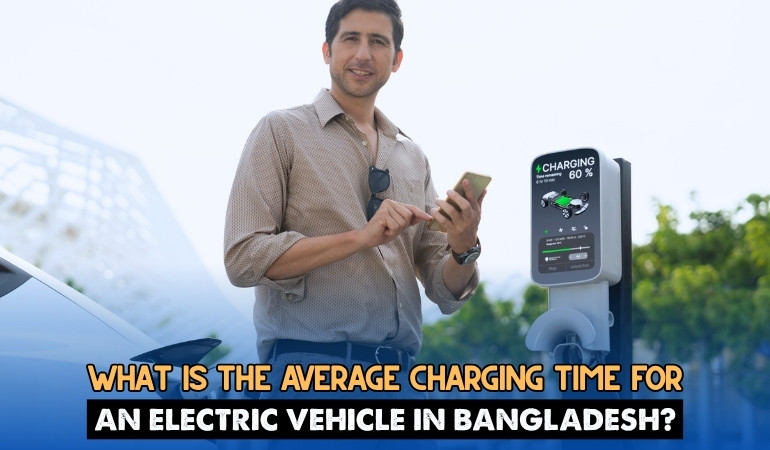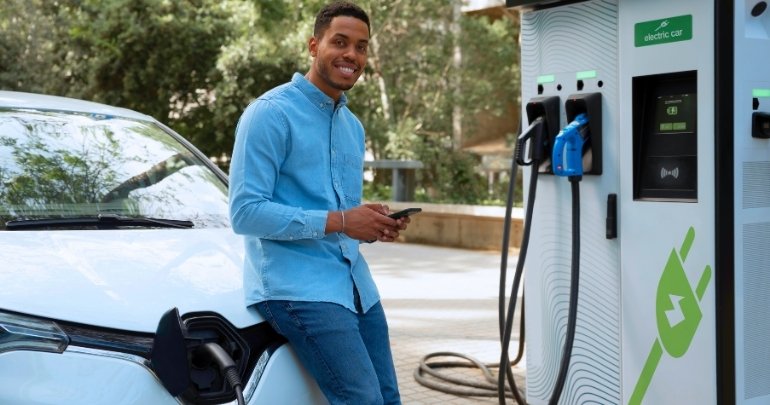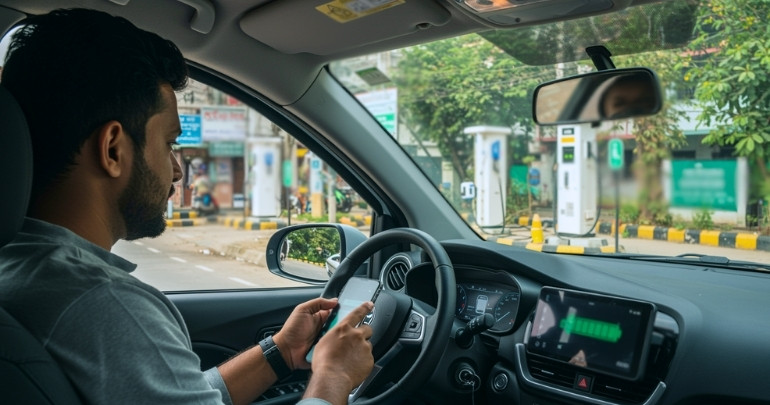Charging an electric car in Bangladesh can take a short or long time. It mostly depends on the type of charger you use. Some chargers are fast, while others are slow. Knowing the time helps you plan better.
So, what is the average charging time for an electric vehicle in Bangladesh?
Most EVs take 8 to 10 hours to charge fully with a Level 2 charger, which people use at home or work. Fast chargers can charge an EV in 20 to 30 minutes, but they are hard to find. Level 1 chargers are very slow and can take over 40 hours, so people don’t often use them for a full charge.
Keep reading to learn more about each option and what’s best for you.
What is the Average Charging Time for an Electric Vehicle in Bangladesh?
Most people in Bangladesh charge their electric cars at home using Level 2 chargers, taking about 8 to 10 hours. If you use an electric vehicle charging station in Bangladesh with a fast charger, it can take 20 to 60 minutes. Level 1 charging takes more than 40 hours, so very few people use it.

The Main Factors Influencing EV Charging Duration in Bangladesh
Several things affect how long it takes to charge an electric car in Bangladesh. Here are the main ones:
Type of Charger Used
- Level 1 chargers are very slow. They use low power and can take many hours to charge.
- Level 2 chargers are faster and common at homes and offices. They usually take 8 to 10 hours.
- DC fast chargers are much quicker. They can charge up to 80% in 20 to 60 minutes. But these are still rare in Bangladesh.
Battery Size and Vehicle Type
- Bigger batteries take longer to charge.
- Plug-in hybrid cars charge faster than fully electric cars because they have smaller batteries.
Electricity Supply
- Charging takes longer when the power goes out or the supply is weak.
- Not all places in Bangladesh have good charging systems, which makes it harder to charge quickly.
Electricity Prices
- Charging stations pay higher electricity prices.
- This can stop new fast chargers from being built, making charging slower for many people.
Charger Setup at Home
- Fast chargers need good wiring and strong power connections.
- Setting them up at home costs more, so some people use slower chargers.
Government Rules and Support
- The government’s policies, taxes, and support plans affect how fast the charging system grows.
- Right now, there are not many rewards for buying EVs or setting up fast chargers.
Technology and Compatibility
- Not all EVs work with all chargers.
- Some chargers are faster because they are better matched with certain car types.
How Does Bangladesh’s Electricity Infrastructure Support EV Charging Time?
Electric vehicles are becoming more popular, but charging them quickly depends on many things in the country. Not all areas have the same level of support, and some places still face power problems. Charging stations are growing slowly, but a lot still needs to be done. Understanding how the electricity system works helps us see what’s improving and what’s still missing.

Power Supply Issues
Bangladesh’s electricity grid can support EV charging, but it’s not perfect. Sometimes, the power supply is weak because of delays in power projects or old systems. These problems can slow down charging and even stop it completely during outages. The government is trying to fix this by making the grid smarter and more stable. A better grid means more reliable charging for everyone.
Charging Station Setup
There are a few EV charging stations in big cities like Dhaka, Comilla, Jessore, and Chittagong. Some of them are working, while others are still waiting for final approvals. Because there are not many EVs yet, people don’t use these stations very often. Still, more stations are being planned for the future. This will make charging easier as more people start using EVs.
Fast Charger Growth
Fast chargers help people charge their cars in less time, which is great for busy drivers. A 180 kW fast charging station is being built for Audi in Dhaka, and more like it are expected. Right now, there aren’t many of these stations, so fast charging is still limited. Placing them in smart spots, like along highways, can really help. These stations will also reduce waiting times.
Solar and Green Power
Some charging stations are starting to use solar power to help with charging cars. This helps reduce pressure on the main electricity grid. These solar-based stations are also better for the environment. Some are even using net metering systems, which send extra solar power back to the grid. This makes the whole system more balanced and useful.
Public Charging Gaps
Many areas still don’t have charging stations, especially outside the big cities. For example, EV charging coverage outside Dhaka is still very limited, making long trips harder for EV owners. Without enough stations, drivers worry about running out of power far from home. Adding more stations along busy roads can solve this problem. It will also encourage more people to choose electric vehicles.
Rules and Money Matters
Charging stations have to follow government rules about how they work. But because there aren’t many EVs yet, companies worry they won’t make enough money. This makes some people hesitate to invest in building more stations. To help, the government could give subsidies or lower taxes. This would speed up the growth of EV infrastructure.
Technology and Setup
How the chargers are installed also affects charging time. Fast chargers need strong and safe electrical connections, which cost more to set up. Many homes don’t have the right setup, so they use slower chargers instead. Making sure all chargers are installed properly will help them work better. This means faster and safer charging for users.
Essential Steps You Should Take While Choosing a Charger for Your EV in BD
When choosing a charger for your electric vehicle (EV) in Bangladesh, consider the following essential steps to ensure compatibility, efficiency, and safety:
| Charger Type | Power Range | Ideal Use Case | Charging Speed | Notes |
| Residential AC Charger | 7.4 kW – 11 kW | Home, apartments, private use | 6-10 hours full charge | Easier installation |
| Commercial AC Charger | 7.4 kW – 22 kW | Offices, malls, commercial | 3-6 hours full charge | Supports multiple vehicles |
| DC Fast Charger | 20 kW – 240 kW+ | Public stations, highways | 20-30 min for 80% charge | Requires higher grid capacity |
Step 1: Identify Your Charging Needs and Location
- Residential Use: Choose a residential AC charger suitable for homes, apartments, or private garages, typically with power ratings around 7.4 kW to 11 kW for overnight charging.
- Commercial/Public Use: Opt for commercial AC chargers or DC fast chargers for offices, shopping centers, public parking, or highways, which support faster charging and multiple vehicles simultaneously.
Step 2: Decide Between AC and DC Chargers
- AC Chargers (Level 2) are common for home and workplace charging, offering moderate charging speeds and easier installation.
- DC Fast Chargers (Level 3) provide rapid charging (50 kW to 240 kW or more), reducing charging time to 20-30 minutes for 80% battery, ideal for commercial or public stations.
Step 3: Check Charger Compatibility with Your EV
- Ensure the charger supports your EV’s charging port type and protocol, such as Type-2 AC connectors or CCS-2 for DC fast charging, which are widely used standards compatible with most EVs in Bangladesh.
- Some DC chargers offer multiple gun options (CCS1, CCS2, ChadeMo) for broader vehicle compatibility.
Step 4: Consider Power Rating and Charging Speed
- Higher power chargers reduce charging time but may require higher installation costs and electrical capacity.
- For home use, chargers around 7.4 kW to 11 kW are typical, while commercial or public chargers range from 20 kW up to 240 kW or more for fast charging.
Step 5: Evaluate Safety Features and Certifications
- Choose chargers with safety certifications such as CE, UL, TUV, and IP65/IP55 ratings for dust and water resistance.
- Look for built-in protections like overcurrent, leakage sensors, residual current circuit breakers (RCBO), and fire-rated housings to ensure safe operation.
Step 6: Installation and Connectivity Options
- Confirm installation requirements (wall-mounted, floor-standing) and whether your location can support the electrical load.
- Check for smart features like Wi-Fi, Ethernet, or Bluetooth connectivity for remote monitoring, control, and integration with apps like ChargeEasy for scheduling and payments.
Step 7: Budget and After-Sales Support
- Compare prices from trusted providers like Crack Platoon, Eparts Bangladesh, or Global Cynax, balancing cost with features and reliability.
- Consider warranty, customer service, and availability of maintenance support in Bangladesh to ensure long-term usability.
Mistakes to Avoid While Selecting Charging Stations for Your EV in Bangladesh
Choosing the right EV charging station is important if you want safe, smooth, and quick charging every time. Many people make simple mistakes that can create big problems later on. Some chargers don’t work well with all cars or places. That’s why it’s good to know what to check before plugging in.

Charger Compatibility
Not all chargers work with every electric car. You need to make sure the charger fits your car’s plug type, like CCS or Type 2. If it doesn’t match, your car might not charge at all or could charge too slowly. Also, check if the power level is right for your car. This helps avoid problems like overheating or slow charging.
Safety and Setup
Using a station without proper safety features can be risky. It might cause electric shocks, short circuits, or even fires. Always choose stations that follow safety rules and have good wiring. Things like proper grounding and safety switches are very important. Safe stations protect both you and your car.
Good Location
Some stations are hard to reach or don’t have proper parking. It’s best to pick stations that are easy to get to and near busy roads. Stations in far or hidden places often don’t get used much. Make sure there’s room for your car and others as well. A smart location saves time and trouble.
Station Maintenance
If a station is broken or not cared for, it might stop working when you need it most. Pick stations that people say are reliable and always working. Look for those that are checked and fixed regularly. It helps if the station has good customer support. That way, you can get help quickly if something goes wrong.
Cost and Charges
Some places charge a lot, and the prices are not always clear. Before charging, check the station’s price list and how they take payments. Some places have separate meters for each plug, which is helpful. Knowing the cost before charging saves you from surprises. This is also important when planning your budget.
Smart Features
Smart chargers can make things easier and save electricity. Features like remote control, time-based charging, and power limits help a lot. They let you charge at cheaper times and avoid using too much power. This is especially useful when thinking about the EV range under local conditions or how far your car can go. Smart tools make charging more flexible and reliable.
Having a Backup
Only using public stations is not a good idea. In Bangladesh, fast chargers are still few and far between. If a station is full or broken, you might get stuck. That’s why it’s smart to have a home charger or a portable one. A backup plan means you can charge when and where you need to.
FAQs About the Average Charging Time for an EV in Bangladesh
Electric vehicles (EVs) are gaining popularity in Bangladesh, and one of the most common concerns is charging time. Knowing the right facts can help users plan better and avoid confusion. Here are 8 helpful FAQs you might find useful:
How Long Does It Take to Charge a Plug-in Hybrid EV in Bangladesh?
A plug-in hybrid electric vehicle (PHEV) usually takes about 5 to 6 hours to fully charge using a Level 1 or Level 2 charger. These cars have smaller batteries compared to fully electric vehicles, so charging time is much shorter overall.
Can I Charge My EV Overnight in Bangladesh?
Yes, most EV owners in Bangladesh charge their cars overnight using Level 2 chargers. These chargers take around 8 to 10 hours for a full charge, making them suitable for home use while you sleep or during long breaks.
Is Fast Charging Widely Available in Bangladesh?
Fast charging is still very limited in Bangladesh, mainly available in major cities like Dhaka. Although more fast chargers are being planned, most people still depend on regular home or workplace charging due to the current lack of fast charging stations.
Does the Size of the Battery Affect Charging Time?
Yes, larger EV batteries take more time to charge fully than smaller ones. A bigger battery needs more energy to reach 100%, which is why electric SUVs, for example, often take longer to charge than smaller electric cars or PHEVs.
Do Weather Conditions Affect EV Charging Time in Bangladesh?
Extreme heat or cold can slow down charging speed slightly and affect battery performance. In Bangladesh’s hot climate, batteries may need cooling, which uses extra energy and may slightly increase charging times, especially during the hottest months of the year.
Can Solar Power Be Used for Charging EVs in Bangladesh?
Yes, some EV charging stations in Bangladesh are starting to use solar power with net metering systems. These setups can reduce pressure on the grid, offer greener energy, and support more reliable EV charging during the day in sunny weather.
Are Charging Times the Same for All EV Brands in Bangladesh?
No, charging times can vary between brands based on battery size and charger compatibility. Some brands support faster charging speeds, while others may limit power input for battery safety, which can change how long a full charge will take.
What Happens If I Use a Lower-Power Charger?
Using a low-power charger like a Level 1 outlet can take over 40 hours for a full charge. While it’s fine for emergency use or slow overnight charging, it’s not practical for regular use with fully electric vehicles in Bangladesh.
Last Briefs
Charging an electric car in Bangladesh takes different amounts of time based on the charger you use. Home chargers usually take 8 to 10 hours, while fast chargers can take just 20 to 60 minutes.
So, what is the average charging time for an electric vehicle in Bangladesh? It mostly depends on the charger, your car, and where you charge it. Public fast chargers are still few, so many people use home chargers.
Picking the right charger and knowing some simple tips can help you charge safely and quickly. As more people use EVs, charging will become easier for everyone.
